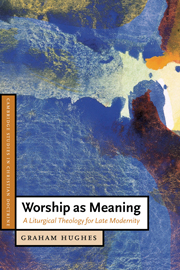8 - At the edge of the known
Published online by Cambridge University Press: 03 March 2010
Summary
‘God’ in two stages
The largest, and unquestionably most challenging, dimension of any putative theory of liturgical meaning in our time is to say how God can make sense for people formed within late modern religious disenchantment. It is to this that I turn in my concluding chapter. The analysis is best undertaken, I shall say, in two stages. I call these: ‘the phenomenon of limit experience’ and ‘religious conviction as an assumed naiveté’. Two prefatory notes will be helpful.
The play of identity and difference
In concluding my survey of the ways in which the theistic references of worship are ordinarily undertaken, I said (page 254) that such references require to be recognizable from within the prevailing cultural matrix, and equally to show the relativity of those cultural assumptions. Another way of saying this is that at the heart of a theorization of theistic references for our time there will need to be a dialectic of identity (recognizability) and difference (alterity). In earlier chapters we had seen that just this dialectic is now admitted as at least one of the constitutive elements of meaning-theory in late modernity. By contrast, classical modernity had committed itself singularly to meaning's identity (in one or another of its various ‘purities’). Thus was meaning presumed to be an intellectual or ideal commodity not contaminated by its material signifiers; it could be identified in widely divergent empirical circumstances; its inherent rationality (better, rationalism) obliterated or severely marginalized alternative viewpoints; and so on.
- Type
- Chapter
- Information
- Worship as MeaningA Liturgical Theology for Late Modernity, pp. 255 - 299Publisher: Cambridge University PressPrint publication year: 2003



